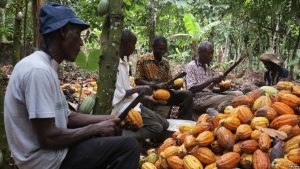Chocolate is a rich, tasty indulgence that I perceived to be universal. However, this week I learned that chocolate is not universal, it is a luxury and surprisingly the very people extracting the raw cacao have not been given access. In lecture 7, we watched a video of cacao farmers in the Ivory Coast that has never tasted chocolate. In fact, they did not know it existed, one man even suspected the beans were used to make wine. It is hard to imagine that their years of hard labor have been to harvest a product that is a complete mystery to them. When they finally tasting the fruits of their labor, their expressions were delighted and surprised. The taste that we are so familiar with, was completely new to these farmers. In contrast, they are accustomed to cutting open orange and yellow pods with machetes to extract the beans. The beans are then dried and fermented before selling.

https://www.voanews.com/a/research-points-to-costs-of-unethical-chocolate/4029498.html
In a contemplative practice, our class had the opportunity to eat both cacao and chocolate, in that order. I didn’t expect the cacao to taste like chocolate, but I wasn’t prepared for just how bitter and dry it was.
This contemplative practice was eye-opening because in my daily life, I never stop to think about who made the food in my mouth, the clothes on my back, or the phone in my hand. For example, many of the cacao beans were farmed in the Ivory Coast by children. These are children who may not get an education because they are being forced to work in hazardous conditions. These disparities show the importance of recognizing the value and privilege that comes with living in a developed nation. With this privilege comes greater opportunities and more luxuries (like chocolate).

Erica,
I really enjoyed your article about the chocolate contemplative practice we engaged in. It is rather bizarre to know that these farmers had never tasted the product they had laboriously cared for/ harvested, yet this is the harsh reality many in impoverished communities face. As we learned in The Color of Food and A Nation Built on Slavery, the food system is chocked full of discrimination and toxic cyclical behavior that has persisted for far too long in such a progressive age. This discrimination can be seen in the statistics regarding the number of minority workers that are paid below livable wages and given the worst jobs in the food industry (typically manufacturing and distribution). And because they struggle to survive or have their basic needs met, these individuals are unable to partake in luxuries such as chocolate. You touched on how it is important for us to recognize the value and privilege of living affluently, but I think something even more significant to recognize is that we must act upon the privilege and not support the corporations which restrict these poor, minority communities. Ultimately, the problem goes far beyond the difference between cacao and chocolate and rather towards a matter of equality.
Hey Erica,
I remember being shocked as you were when I learned just how much of a luxury chocolate really is. Personally, I always considered chocolate to be a very raw and easy to make thing. I’m not sure why, but I just assumed it was just ground up cacao. But, there’s so much more processing between when a farm worker picks it to when it arrives in a candy package to me. So, I never realized the weight of the global food system on what I considered to be such an accessible treat. I was heartbroken and also found it hard to imagine what it must have been like to work so hard for an industry where many workers never reap the fruits of their labor. Just like you, this also makes me think twice about the journey material goods take to get to me. For me, chocolate is as easy as going to the store, but I never had to bleed or sweat to obtain it. Child labor is such a difficult subject to tackle. But, the sad reality is if we truly stood by our morals and boycotted things that were unethically made like chocolate or certain clothing or other material goods, we’d have nearly nothing. You’re right. It really is such a privilege to experience these things and it is activates like the chocolate one that reminds us of that.
-Abner P.